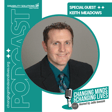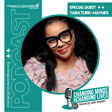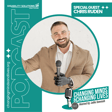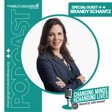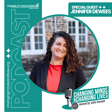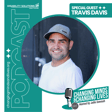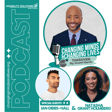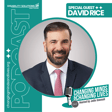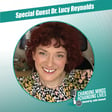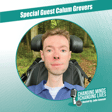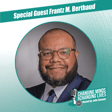Introduction to Changing Minds, Changing Lives
00:00:00
Speaker
Welcome back to Changing Minds, Changing Lives podcast. My name is Julie Sowash. I am one of the founders and strategic advisor for Disability Solutions and the host of this amazing podcast where I get to have conversations with really incredible people in our community um from around the world.
Meet Caden McElwain: Autism Advocate
00:00:19
Speaker
And today I'm actually excited to welcome a fellow Midwesterner from Ohio, if I'm remembering correctly. um Caden McElwain to the show. He is an autism activist, a public speaker, a journalist, and a contributor at the Autism Digest, which I'm sure is not doing him nearly just any justice. But I do want to welcome Caden to the show today.
00:00:42
Speaker
Caden, welcome and tell us a little bit about yourself. Absolutely. Thanks for having me. Have you pretty much summed it up. I'm a public speaker, a writer, an activist, a contributor for Autism Digest. In fact, after this interview, I'll be interviewing someone for their YouTube channel, Angelo Santibarro, who's an autism advocate as well.
00:01:07
Speaker
and who's actually a state representative in New York. wow I was diagnosed when I was two years old and because of the stigma surrounding autism around that time, which was 2006, I'm about to 21 this year, my capabilities were questioned due to society's ignorance of autism.
00:01:24
Speaker
But thanks to a very supportive set of parents, who support me still even to this day. I was able to prove those people wrong, graduate high school early during the pandemic while working two jobs, both fast food jobs to be exact, and I'm a college junior currently with five consecutive deans lists about to have number six come May.
00:01:46
Speaker
Wow. So I didn't do very well on your accomplishments then. That's ah that's incredible. That's incredible. So you are a junior in college.
The Birth of Advocacy: College Project
00:01:55
Speaker
What are you studying? I'm a communications major currently, but I'm wanting to minor in technology.
00:02:02
Speaker
In technology. And you have a YouTube channel? I have a YouTube channel for the public speaking stuff I do and any mock speeches I do, but I mainly do interviews for the Autism Digest to YouTube channel.
00:02:17
Speaker
Okay. So tell me how you got started in advocacy. Was it just something that was naturally part of your your demeanor and and your personality the whole time? Or did you get started later in your high school or college education?
00:02:33
Speaker
hip I officially started my advocacy work with a class project in my freshman year of college tax. Lily, you got that? Right. The assignment was to think of a way to help the community and act upon it, so my group and I decided on a GoFundMe for the Autism Society of America.
00:02:49
Speaker
We raised over a thousand dollars for it, and I had the chance to do a lot of cool stuff, getting into the paper, winning a contest with the project, that the school was having, and I connected with a regular advocacy partner in my community, Michael Zurn, who's the treasurer of my county.
00:03:10
Speaker
We sat out to him, but I saw, and this is typical of my generation, the TikTok generation, My group really wasn't into the project, they only wanted to do it to but get the grade and the prize money we got.
00:03:22
Speaker
So I ended up doing the majority of the work, and I noticed that we don't take autism seriously enough in this country, especially when it comes to adult resources.
Challenges in Autism Resources and Support
00:03:31
Speaker
So as the saying goes, one thing led to another end.
00:03:34
Speaker
Look where I'm at now! Oh, no, that's that's amazing. So can you elaborate a little bit on what you just said in that we don't take autism seriously in this country, especially I think what you said is critically important for adults living with autism?
00:03:51
Speaker
it Absolutely. absolutely how I think we can take it seriously. leave But the problem is, at 18, autistic individuals especially the united states end up with nothing or, even worse, having to jump through hoops to get the resources that they need.
00:04:09
Speaker
I know for sure, one thing I was trying to get was social security and medicaid, a but those are completely gone forever, and you have to provide proof of diagnosis to get them anyway. It's honestly my opinion that once you're diagnosed at, say, 2 years old, 3 years old, you shouldn't be questioned about that again. And actually, even school!
00:04:32
Speaker
Your capabilities are questioned. I remember a time particularly, and I tell this in almost every media appearance I do, where my IEP, or Individualized Education Plan, was cut completely without my parents' consent.
00:04:45
Speaker
And my parents had to play long and hard to get that implemented and again. so they just took your IEP away altogether? Yeah, in middle school. The reason they gave was that I was doing well academically, so they assumed I didn't need that. When, as I'm sure you know, being in this field for as long as you were, that's not how autism works. It's more so social, emotional, communication.
00:05:11
Speaker
Yeah, absolutely. So, you know, and I think you you raise a really good point, two things that I just want to make sure our audience who hasn't heard this on this podcast before take away is one that when you are a young person who is diagnosed with a disability, in this case, autism, you know,
00:05:29
Speaker
You have a set of services that kind of follow you along until you, what we call in the, in the industry age out of those services. Basically you become an adult, you turn 18.
00:05:41
Speaker
What I think a lot of people don't know is that when you turn 18, you Exactly. Exactly.
00:05:49
Speaker
and to your point none of those actually follow you along into adulthood it's like ah almost like a clean break from this kid to a whole new person once you turn eighteen exactly And then, you know, with school, pre- or post-secondary, so middle school, high school, you had an IEP, which is a plan that helps people, students with disabilities, make sure that they get access to the services or accommodations that they need in in the most simple terms.
Education System and Disability Support Cuts
00:06:20
Speaker
And correct me anywhere here if if you want to. But right now, We're living in I think, for Americans with disabilities, autistic Americans, a pretty scary time.
00:06:32
Speaker
And if we start even at... the cuts at the Department of Education and the appointment of a secretary in Linda McMahon, who quite frankly didn't even know what idea was um when she was interviewed on Fox News.
00:06:48
Speaker
Tell me what what your thoughts are on how the cuts at the Department of Education are going to impact um people with disabilities, students with disabilities, given you're pretty young, you still know what it was like to be there.
00:07:03
Speaker
Yeah, I definitely do help. It's gonna be disastrous. I'm worried for those kiddos, especially the younger generation. I'm lucky enough that I was in a time where it was common knowledge that such-such student might need a little extra help in class.
00:07:22
Speaker
room, that nowadays we have people who are so overly psychotic and ignorant that they're willing to make horrible decisions that impact everyone, not just special needs students, but everyone, both physically and emotionally.
00:07:40
Speaker
And as soon as Trump was elected, i made it clear on my Facebook that no matter what happens, I'm going to continue to advocate for this cause. That's how much I believe in it. Honestly,
00:07:52
Speaker
What are going to do? Beat me up? And I i mean, i think you just gave me so much to unpack there. um You know, with if we stick with the Department of Education and then I want to talk more about using your voice, um you know, the the cuts at the Department of Education are going to significantly harm students with disabilities and their families. And you made such a a critical point when you said,
00:08:18
Speaker
You were lucky because even though you just pointed out ah several challenges that you had going through the education system, you have incredible parents, you're a self-advocate, you've had the right resources around you, but you still hit barriers that you needed
The Stigma of Disabilities and Political Impact
00:08:35
Speaker
supports with. So...
00:08:36
Speaker
IDEA provided some of those supports, your parents provided some of those supports. And now what we're seeing is with all the cuts to education, as well as the the elimination of the civil rights office within the Department of Education, really all of those protections and all of those, quite frankly, rights that we have as people with disabilities, as students with disabilities,
00:09:02
Speaker
being not stripped away, but functionally eliminated because we're taking away resources and we're taking away the people who would otherwise enforce those civil rights for students with disabilities through the Department of Ed.
00:09:20
Speaker
yeah Exactly. And, you know, I will say then if we talk about using our voices. I think a lot of us, and I will say that this has certainly crossed my mind, are getting more fearful now about continuing to identify as people with disabilities, both online and in person, if our disabilities are not obvious.
00:09:47
Speaker
um Tell me why you felt like it was important for you to take that stand ah during you know January when the administration changed that you're not going to be silenced.
00:09:58
Speaker
Because I've worked you hard to
Critique of Autism and Vaccine Misinformation
00:10:01
Speaker
stand by and watch chaos unfold. In fact, bag can we'll probably cover this, one of the first things I did in that aspect was write a piece about the RFK thing, because society needs to hear it from actual autistic people, not people with degrees, not people in fancy suits, not people with brain worms, actual autistic people and those who lived those experiences.
00:10:30
Speaker
So tell me tell me about that. Tell me about the article and how you related to our now health and human Health and Human Services Secretary, Robert Kennedy Jr. In that piece, I, of course, didn't just denounce the theory, because it's common knowledge, that theory, which I'm sure you know about, has been proven as snake oil and rubbish time time again.
00:10:58
Speaker
For centuries now, way before my time, but but I made a clear article that RFK Jr. is a huge hypocrite. He has no right to talk about autism the way he does when his own family has their own history with the disorder, Rosemary Kennedy specifically.
00:11:18
Speaker
Yeah, so just and just in case, listeners, viewers, you don't know um what what we are referring to. So um for a long time, there was a ah false information in the world that said um autism was directly related to vaccines. That information has been disproven.
00:11:41
Speaker
The doctor who did that, doctor, air quotes, was... was disproven, debunked, and that is false. So vaccines do not cause autism.
00:11:53
Speaker
And Robert Kennedy has made a lot of money off peddling these types of lies and conspiracy theories to, and that's helped promote what we see now in Texas, which is a ah giant measles outbreak um because parents are still choosing not to vaccinate their children.
00:12:16
Speaker
Now, what you mentioned, I think, just after that is something that's been a really compelling
Historical Perspectives on Disabilities
00:12:25
Speaker
but story interest. I don't know exactly the right way to say it of mine. So Rosemary Kennedy, a sister to John F. Kennedy, Robert F. Kennedy. Tell me a little bit more about or tell our audience a little bit more about Rosemary Kennedy.
00:12:40
Speaker
ah Absolutely. She had intellectual disabilities, most likely autism based on what I read and some of her mannerisms she had.
00:12:51
Speaker
Her family, I'll give them credit, tried hard to get her the proper resources, but... After Pat LaBona meet, that Joe Kennedy Sr. got her behind his wife's back just to protect their political image, Rosemary was never the same as he ended up tying in a group home mal alone.
00:13:14
Speaker
Yeah, I was actually just refreshing myself on the Rosemary Kennedy's Dory this morning, so a lot of us have never even heard of Rosemary Kennedy. In fact, I said to my husband getting ready for this interview, i was telling him I was excited to chat with you and that you had brought up Rosemary Kennedy with with Ashley in our our pre-record and he said, who's Rosemary Kennedy?
00:13:38
Speaker
And... So I got to tell him that story of a beautiful, vivacious young woman who lived with a disability, whatever that disability was. We don't really know developmental autism.
00:13:51
Speaker
um And she was hidden away from the world ah it when she became an adult. And then eventually around the age of 23 was lobotomized, which,
00:14:03
Speaker
um it terrifyingly enough, not only didn't cure her as it was supposed to that snake oil at the time, but it actually read led to um
00:14:16
Speaker
physical disabilities, the loss of her ability to speak. And then she was hidden away and not even allowed visitors until after her parents both passed away in the really...
00:14:29
Speaker
so really To me, and I would love to hear your opinion, what that says to me is
00:14:37
Speaker
that because of, I won't even give any credit to the time, but because of what Joe Kennedy did to protect his family's
00:14:49
Speaker
reputations, credibility, and political prowess, they hit away a a perfectly capable child who happened to have a disability and then traumatized her physically and then pretended she didn't exist.
00:15:04
Speaker
That has to have, in my thought process, really influenced the way that now the head of our Health and Human Services thinks about people with disabilities in general.
00:15:16
Speaker
I absolutely agree. I'll give the Kennedys credit though. They have tried to correct that wrong. I think one of them founded the Special Olympics and if RK Jr. didn't spew autism conspiracy theories, I'd actually agree with him.
00:15:36
Speaker
Because I do agree that this country should be healthier. We shouldn't be eating... fast food food and putting all these preservatives in our meals. I myself have been able to kick kenerg energy drinks.
00:15:50
Speaker
I used to consume those when I was a teenager, sure sometimes five a day with the most being 12 in one sitting. my gosh. After reading how unhealthy they were, I cut back on them and now I do one a month, maybe she if I have a test coming up.
00:16:10
Speaker
and If EarthK Jr. was a good person and didn't spew autism hatred, I would say he has a good point about making this country healthy.
00:16:22
Speaker
But his mouth gets him in trouble. That's what my parents always say. Yeah. Yeah, I say that as a mom a lot too. um Yeah, I mean, yes, I certainly think that we could and should be. I live in Europe a lot of the year and I know how different I feel just based on my diet there versus my diet here. um and And I absolutely agree with that.
00:16:48
Speaker
but how But we can't really give any credit to someone who would spew things that he knows because his children are vaccinated. that are are untruths, that are are are falsities and conspiracy theories in order to monetize on people's fears.
00:17:08
Speaker
Yeah, exactly. That honestly makes things even worse. I didn't even know he was monetizing Metzunic oil until you just told me.
Immigration and Disability: A Human Rights Issue
00:17:18
Speaker
Yeah, it's ah it's it's a long history. I'll share a few things with you when we hang up.
00:17:24
Speaker
So... Last but not least is we've covered a lot of ground this week and we've been able to provide some political information some real life context to the things that we see, the political things that we see on the news, how this is going to impact children with disabilities with Linda McMahon at the head of of the Department of Education, how we've reduced resources and support through this, how we're returning money to the states,
00:17:56
Speaker
um without guarantees that we're going to have civil rights protections for our students in universities or in high school, elementary school, middle school, and at university level. We now have a head of our health and human services that um not only continues to spew untrue autism related vaccine information, but actually has just recently hired ah his mentor in this field, David Greer, back into the HHS to help review these now debunked studies and find try to find a link between autism and vaccines, even though we know that that's not true.
00:18:39
Speaker
The last thing I just wanted to cover with you is we also have had
00:18:51
Speaker
immigrants who've been living in this country in various status be, won't say deported, I will say unlawfully taken out of the country and put in a supermax prison in El Salvador without any due process.
00:19:06
Speaker
And as horrifying as that is and how much it breaks my heart every single day, also want to point out that one of these individuals also has a connection to our community that we know about.
00:19:19
Speaker
So, ah and I'm not going to do joseph's justice to his name, but Niri Jose Alvarado Borges, who is um been in the United States for quite some time, worked at a local deli, his family is fully here, was taken out of the United States and unlawfully taken to El Salvador because he had an autism tattoo because his brother is a person who lives with
Promoting Kindness and Open-mindedness
00:19:49
Speaker
autism. Any reaction to to that
00:19:52
Speaker
I think it's outrageous. I have an autism tattoo myself. Both right here. yeah and I haven't gotten arrested for it yet. So, hyrid that's pure ignorance on their end, or at least coincidental.
00:20:09
Speaker
Or, that's racially motivated. It's most likely the latter. It's definitely a racial thing if he was truly deported for having an autism tattoo.
00:20:22
Speaker
Yeah, and well they said that autism tattoo might be related to a gang. it don't know any gangs, but have autism tattoos.
00:20:33
Speaker
Thank you for clarifying that. I don't either. oh So anything that you would leave us with today that would help people in the community um better understand how to continue to advocate for people with autism, how to better understand all of this flood of information that's coming at us every day and and to decipher how it's gonna impact our communities.
00:21:04
Speaker
Absolutely. I would say be open-minded and be kind, not just about autism, but about any ethnic group, no matter the race, disability, gender, there orientation.
00:21:18
Speaker
They're amazing as is and just as capable as anyone else. And if you can't see EBIT, then there's a problem with you, not them. You're the ones missing out on a good person.
00:21:30
Speaker
Yeah, and great, great friendships, great
Conclusion and Social Media Connections
00:21:32
Speaker
relationships. I think that is the perfect place to wrap us up today, Caden. If our listeners want to have you come and do some public speaking at their organization, want to learn more about the work that you do around advocacy or follow the Autism Digest, how do they get hold of you?
00:21:50
Speaker
You can follow me on Facebook at CadenRonald, K-A-D-I-N-R-O-N-A-L-D. You can connect with me on LinkedIn at Kaden Ronald McWane, K-A-D-I-N, R-O-N-A-L-D-M-C-E-L-W-A-I-N,
00:22:05
Speaker
and you can follow me on YouTube at Kaden McWane, K-A-D-I-N, M-C-E-L-W-A-I-N, or if you want to watch my Autism Digest stuff, you can follow me on the Autism Digest YouTube you page.
00:22:20
Speaker
Awesome. Amazing. So we'll share those links in the show notes and on the YouTube channel when this comes out. Caden, thank you so much for joining us, having a conversation and helping our viewers and understand some of the turmoil that we're experiencing and how it relates directly back to our community. Thanks for having me.

